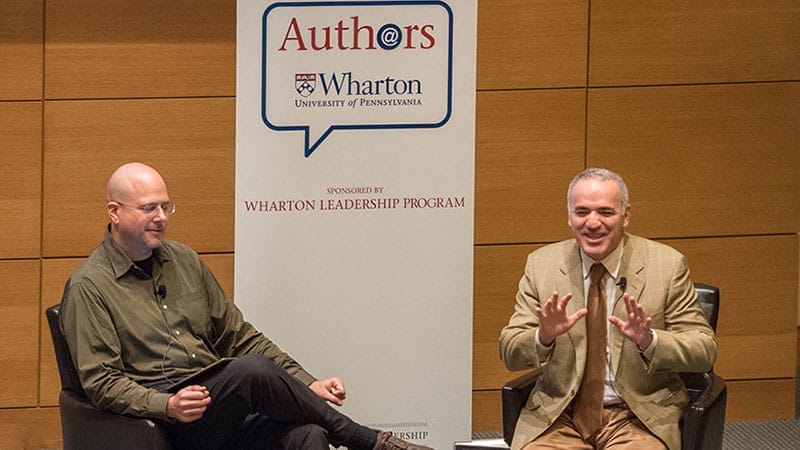What defines a Wharton education? Sure there’s the data analytics, comprehensive finance courses and exposure to the world of business, but bolstering the quantitative courses are leadership opportunities to consider real-world issues. Such as Authors@Wharton series.
Garry Kasparov came to campus during the fall series to discuss his new book Winter is Coming: Why Vladimir Putin and the Enemies of the Free World Must be Stopped, in which he explores the challenges and implications of resisting threats to the free world. By his own summation, the book tells three stories:
- His own story: the personal perspectives of somebody who is actively participating in the protests in Russia.
- The rise and fall of the Russian democracy.
- And what the world did and did not want to do to prevent recent events surrounding Russia.
“I wanted to address the idea that history is cyclical, not linear,” he told the audience.
As someone with little to no knowledge about the topic, I found it incredibly interesting to have my first exposure to this worldly issue straight from the mouth of a leading expert. Kasparov, who was the world chess champion for 20 straight years, applied his analytical skills to the problems facing the free world today. While he calls for the end of the Putin regime in Moscow, he recognizes that the Russian leader has been in power for too long for his demise to not bring about serious repercussions.
For me, a school experience is not just the classes you take, but the complementary events you take advantage of. Jane Chen, the Wharton and College senior who serves as undergraduate coordinator for Authors@Wharton, states the goal of the series along similar lines.
Why does Authors@Wharton bring in these incredibly intriguing, but sometimes not so obviously related, authors to the University? The likes of Arianna Huffington, Malcolm Gladwell, David Pottruck, Peter Thiel, Martine Rothblatt, Mitch Albom and Mark Cuban.
“Our mission is to encourage intellectual curiosity and learning amongst all students at Penn on a slew of business (and sometimes non-business) topics, from cutting-edge researchers and businessmen who have published recent books,” Chen answered. “Wharton provides an amazing platform of diverse speakers, offering fascinating opinions on a wide range of topics in organizational behavior, social science, management and life in general.”
Kasparov’s visit in particular seemed to be an event set up to broaden the horizons of students at Wharton.
“In general, the goal is just for exposure to diversity of thought, so we try to find a right blend that doesn’t put too much emphasis on any one particular area,” Chen agreed. “In particular, I was interested to understand the ways in which strategic decision making in chess could be applied to lessons in politics.”
Though the connection between balancing profit-and-loss statements and a world-renowned chess player/advocate for the free world may not be perfectly clear, it is exactly these types of events offered by Wharton that help its students become holistic thinkers. In order to understand the way business interacts with the real world, it is necessary to be exposed to issues that affect people from all walks of life. I am grateful for the opportunities presented to us, because it means that I am part of an institution that values world issues alongside its curriculum.
Editor’s note: Adam Grant, Wharton’s Class of 1965 Wharton Professor of Management, launched the Authors@Wharton speaker series in 2012. From the start, it has been bringing world-renowned authors of trade books to campus for free for all students, alumni and members of the Penn community. More information and the list of upcoming authors can be found on the Wharton Leadership Program website.


























